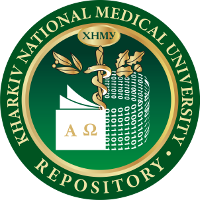ISSN 2310-8363
Репозитарій Харківського національного медичного університету – це відкритий електронний архів академічних текстів, матеріалів наукового та навчально-методичного призначення, створених науковцями, викладачами, іншими працівниками університету та здобувачами
- Положення про Репозитарій Харківського національного медичного університету
- Авторський договір про передачу невиключних прав на використання твору
- Репозитарій ХНМУ: поради автору-депозитору
- Приклади бібліографічного опису документів
З усіх питань щодо Репозитарію ХНМУ звертайтеся до координатора Тетяни Павленко за адресою: repository@knmu.edu.ua

Communities in DSpace
Select a community to browse its collections.
Recent Submissions
Burnout-Risiko von Anästhesisten und Intensivmedizinern in der Ukraine unter Kriegsbedingungen
(DGAUM, 2025-04) Stukalkina, Diana; Zavgorodnii, Igor; Завгородній, Ігор Володимирович; Litovchenko, Olena; Літовченко, Олена Леонідівна; Sushchenko, Elina; Shenher, Anastasiia; Kapustnyk, Valerij; Thielmann, Beatrice; Böckelmann, Irina
Der Einfluss veränderter Arbeitsbedingungen auf die Entwicklung von beruflichem Burnout bei Erzieherinnen in der Stadt Charkiw
(2025-04) Paramonova, Anna; Завгородній, Ігор Володимирович; Zavgorodnii, Igor; Лисак, Марина Сергіївна; Lysak, Maryna; Kapustnyk, Valerij; Kalinin, Danylo; Koval, Sofiia; Darius, Sabine; Böckelmann, Irina
Вплив використання гаджетів та природного світла на циркадні ритми студентів
(2025) Мокрякова, Марина Іванівна; Поповкин, Михайло Євгенович
The impact of indoline derivatives on the carbohydrate metabolism of rats within a cold stress model
(2025-12-10) Lutsenko, R.; Bilovol, O.; Knyazkova, I.; Sydorenko, A.; Purdenko, T.; Lutsenko, O.
Th is study investigated the protective eff ect of 2-oxoindoline-3-glyoxylic acid derivatives and its mechanisms upon cold injury in rats. Th e protective activity of 13 newly synthesized 2-oxoindoline-3-glyoxylic acid derivatives was evaluated at a dose of 12 mg/kg body weight administered intraperitoneally. One hour aft er administration, the physical endurance of male rats was assessed under cold stress conditions (water temperature +10 °C) with an additional load (10% of body weight) by measuring the duration of swimming (in seconds) until the appearance of complete fatigue (immersion). Th e results were compared to those of the reference substance ethylthiobenzimidazole at a dose of 50 mg/kg. Th e most eff ective results were observed aft er the administration of 2-hydroxy-2-(5-methyl-2-oxy-1,2-dihydroindol-3-ylidene)-N-phenylacetamide. In animals, serum glucose levels and carbohydrate metabolism indicators in hepatocytes (glycogen, glucose, pyruvate, lactate content and their ratio) were determined. It was established that administering 2-hydroxy-2-(5-methyl-2-oxy-1,2-dihydroindol3-ylidene)-N-phenylacetamide signifi cantly prolonged the duration of swimming in cold water, compared to both the control group and the group administered ethylthiobenzimidazole. Under hypothermic conditions, this compound prevented hypoglycaemia and positively aff ected carbohydrate metabolism in the liver, as evidenced by preserved glycogen, glucose and pyruvate content, and increased lactate levels.
Біоетичні аспекти застосування симуляційних технологій для викладання внутрішньої медицини під час воєнного стану
(2025) Журавльова, Лариса Володимирівна; Федоров, Володимир Олександрович; Олійник, Марія Олександрівна; Сікало, Юлія Костянтинівна
У зв’язку з російською військовою агресією проти України проведення повноцінних офлайн-занять у прифронтовому Харкові стало неможливим. Через це з 2022 р. в освітньому процесі широко використовуються технології дистанційного навчання. Одним із таких інструментів є Європейський формат Clinical Case Discussion (CCD), який у класичному вигляді передбачає проведення занять у форматі безпосередньої взаємодії між викладачем та студентами. Однак в умовах воєнного часу ми адаптували цей метод для онлайн-формату, зберігши його ключові освітні та біоетичні переваги. Незважаючи на відсутність особистої присутності студентів у клініці, збережено ключові елементи методу – інтерактивність, командне обговорення, структурований аналіз клінічного випадку та розвиток клінічного мислення. Така модифікація дозволила продовжити якісну підготовку студентів, попри фізичну неможливість зустрічей в аудиторії. CCD у дистанційному виконанні стає важливим елементом сучасного освітнього процесу, допомагаючи здобувачам освіти та молодим фахівцям занурюватися у світ реальних клінічних ситуацій, розвиваючи аналітичні здібності та впевненість у професійній діяльності Важливе місце в навчальному процесі займає формування етичної компетентності майбутніх лікарів, тому обговорення клінічних кейсів CCD включає розгляд не лише медичних, але й етичних рішень, що сприяє усвідомленню професійної відповідальності та розвитку готовності до реальної лікарської практики. В процесі онлайн-адаптації CCD особливої ваги набуває роль викладача як гаранта дотримання біоетичних принципів – саме він формує безпечний простір для дискусії, контролює конфіденційність та недопущення дискримінації, а також спрямовує обговорення таким чином, щоб студенти не лише відпрацьовували клінічне мислення, але й розвивали етичну відповідальність.
